The World of Michael Chow
Updated: 2015-05-01 09:57
By Zhang Kun in Shanghai(China Daily USA)
|
||||||||
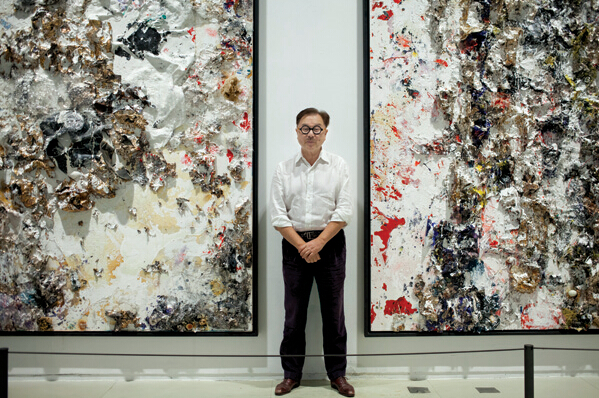 |
|
Michael Chow showcases his paintings in Shanghai. Most are abstract pieces and collages featuring thick layers of paint and unusual materials like gold. [Gao Erqiang / China Daily] |
From James Bond villain to celebrity restaurateur, the founder of Mr. Chow did more than follow in his famous father's footsteps.
The name Mr. Chow may ring a bell, especially if you have dined at one of the eponymous celebrity Chinese restaurateur's eateries in Beverly Hills, Malibu or New York City.
But even those who have eaten at the popular Chinese restaurant chain may not know the story about its owner, Michael Chow, who is also respected as an artist and the son of one of China's legendary performing artists.
Mr. Chow opened its first outlet in London's Knightsbridge in 1968. It launched in the United States six years later with a branch in Beverly Hills, becoming one of the first upscale Chinese restaurants in the country. It later expanded to Tribeca in downtown New York and Miami's South Beach. In 2009 it added another location in Malibu, California.
Its founder is now presenting an exhibition at the Power Station of Art (PSA), Shanghai's first public museum of contemporary art.
Voice for My Father features paintings and collages by Chow and historical documents about his father, Zhou Xinfang, one of the great masters of Peking Opera. The show includes a series of portraits of Chow by famous artists.
"Chow" and "Zhou" are different spellings of the same Chinese character and family name. Chow is the traditional spelling while Zhou conforms to the official pinyin spelling recognized on the Chinese mainland.
The reason why their names are spelt differently is because Michael left for Britain at the age of 12 while his father continued to live in China until his death in 1975.
"The Zhou family have gone through a long journey of art," said Li Xu, vice director of the PSA. He said Chow inherited the essence of his father's art and adopted the same spirit in his painting. He also praised Chow's creations as striking in terms of both their visual expression and use of materials.
As an entrepreneur and designer, Chow has befriended people from all walks of life, including many in the art, fashion and entertainment industries.
Many people have influenced his creations; some were inspired by him; one created a portrait of him sporting a mustache and round glasses, framed inside a bathtub of Mr. Chow's signature green prawns.
Chow's own paintings are largely abstract pieces and collages featuring thick layers of paint and unusual materials like gold.
He said he wanted to place "the impossible" and "the irrelevant" together harmoniously and create with a "controlled spontaneity", which he believes is the essence of his father's Qi school of Peking Opera.
Earlier this year, Chow's solo exhibition opened at the Ullens Center for Contemporary Art (UCCA) in Beijing to mark the 120th anniversary of the birth of his father.
For the Shanghai show, Chow created a new series of collages by burning paper and trapping the ashes between the canvas and a protective screen.
Chow compared his own life to a collage, where different elements come together to form one big picture.
He has been a painter, designer, restaurateur and actor. He has appeared in 16 movies including the James Bond classic You Only Live Twice (1967), Jackie Chan's Rush Hour and Lethal Weapon 4 (both 1998). His sister Tsai Chin appeared as a Bond girl in the same Sean Connery movie, while Chow played bad guy Spectre 4.
Speaking at the exhibition hall in Shanghai, Chow spoke at length about his art and life in a mixture of Shanghai dialect, English and mandarin. As he spoke, he frequently struck dramatic poses. At one point, he removed one of his shoes to illustrate his beliefs about the creation of art.
Chow was born in Shanghai in 1939. Among his fragmented childhood memories, he recalls some turbulent times: flooded streets and armed burglars breaking into his parents' house.
His first encounter with Peking Opera as a young boy was not exactly pleasant, either. As he walked backstage, he became terrified by the makeup on the faces of the actors.
But as he grew up, the sound of Peking Opera would get into his blood. He was given the same nickname as his father - "Xiao Qi Ling Tong" (The Seven-Year-Old Kid) - a prestigious moniker that Zhou Xinfang earned because his first successful public performance took place when he was only seven.
Chow is Zhou's fifth child and second son. His mother Qiu Lilin was a liberated woman with one Scottish grandparent. She was well-educated and came from a wealthy family, but eloped with Zhou at a time when actors belonged to the lowest social class in China, next to beggars and prostitutes.
Qiu managed the business side of Zhou's career as efficiently and successfully as she ran the house. The family lived in a big house in the former French Concession, with everything taken care of by servants.
It was she who decided to send two of the children, 12-year-old Michael and 17-year Tsai Chin, to study in Britain in the 1950s.
Tsai Chin was admitted by the Royal Academy of Theatre in London. She later became famous for her theater performance of The World of Susie Wong, based on Richard Mason's classic 1957 novel.
Chow was traumatized by his first few years at an English boarding school. He suffered from asthma as a child and was spoiled by his parents.
In England, all the comforts of home were taken from him and the shock was so acute that for a long time "I couldn't get anything right," he said. He later spent time at a vicarage for troubled boys.
Chow said this mixed history ultimately provided him with all the ingredients he needed to be an artist.
He studied architecture at Saint Martin's School of Art in London. One of his first design projects was the Hawes hairdressing salon in Sloane Ave, Kensington, and he went on to create a number of boutiques and restaurants.
In the 1980s, he was asked by Giorgio Armani to design the fashion brand's boutiques in New York and, later, Las Vegas.
Although Chinese food has always been popular, most of what was available in England at that time was fairly simple and cheap. Chow wanted to show his adopted country the finest food from China.
He chose to serve Beijing cuisine, which was originally created to please Chinese royalty and aristocrats in the Forbidden City.
He designed the restaurant in a classy way, hired good-looking waiters and put a strong emphasis on good service.
"I wanted our customers to respect my people, my country and my culture," he said.
While he believes being an artist is the noblest of professions, he also wants to be remembered for his Mr. Chow restaurants, he said.
zhangkun@chinadaily.com.cn
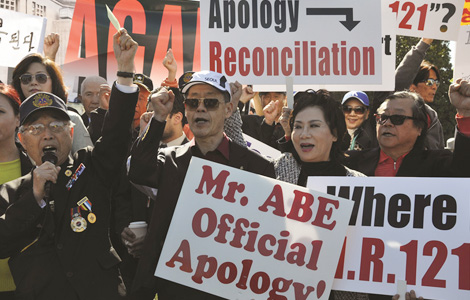
 Across America over the week (from April 24 to 30)
Across America over the week (from April 24 to 30)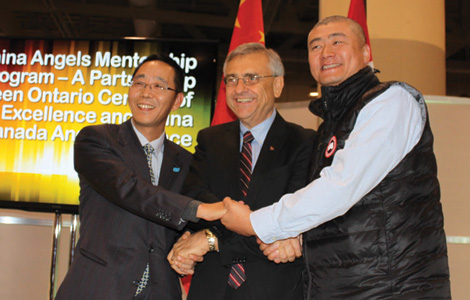
 Across Canada (May 1)
Across Canada (May 1)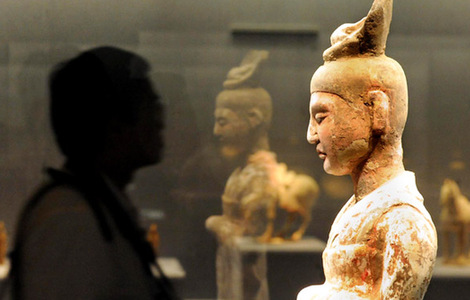
 China's top 10 GDP provinces in Q1
China's top 10 GDP provinces in Q1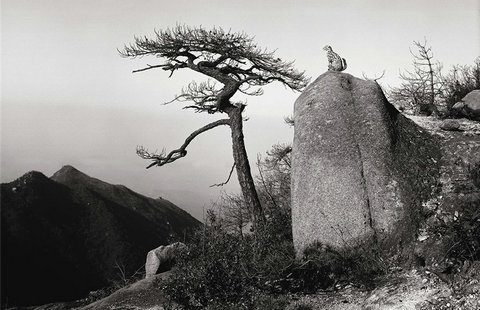
 Photos capture marvelous landscapes of China
Photos capture marvelous landscapes of China
 Mass exodus from Kathmandu
Mass exodus from Kathmandu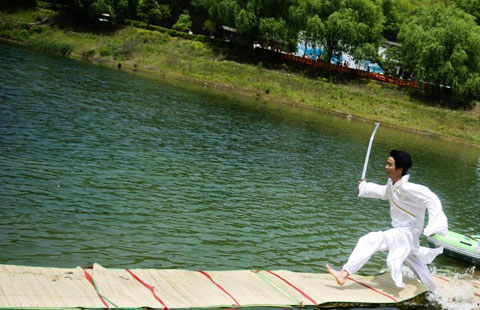
 Running on water: a nearly impossible feat
Running on water: a nearly impossible feat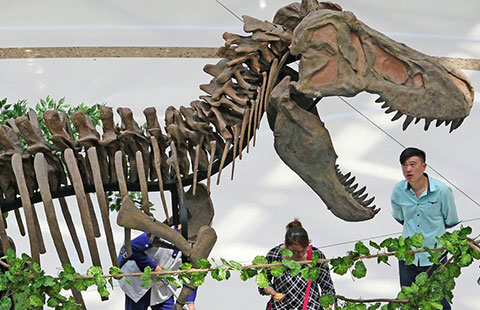
 Ten photos you don't wanna miss - April 30
Ten photos you don't wanna miss - April 30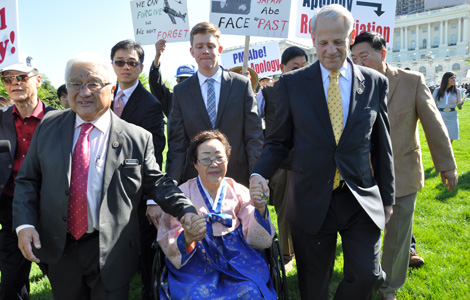
 'Comfort women' survivor attends protest of Japan PM
'Comfort women' survivor attends protest of Japan PM
Most Viewed
Editor's Picks

|

|

|

|

|

|
Today's Top News
Abe protests continue in SF
Abe betrays history's conscience
The 'nightmare' everyone saw coming
Vancouver property developer identified as Chinese fugitive: report
Freddie Gray tried to hurt himself in police van
China trainmakers seek control of Bombardier's rail unit
New rich set sights on tech, media and telecom sectors
US rapped for stance on Japan
US Weekly

|

|






